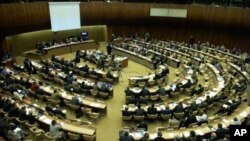Syria has dropped its controversial bid for a seat on the U.N. Human Rights Council. There has been growing international pressure for Syria to withdraw its bid as its two-month military crackdown on peaceful anti-government protesters continues.
Syrian U.N. envoy Bashar Ja’afari said his delegation and Kuwait’s called for the meeting of countries belonging to the so-called Asian Group to inform them the two governments had made an agreement between themselves to trade candidacy slots.
Kuwait will now run for the 2011 to 2013 term and Syria will postpone its candidacy and take Kuwait’s place on the slate for the 2014 to 2016 term.
Asked if Damascus made this decision under pressure or because it wants to focus on events at home, Ambassador Ja’afari said that was not the reason. “It is a sovereign decision based on the Syrian government’s will to reschedule the timing of our candidacy. Rescheduling the timing of our candidacy based on reconsidering our priorities on the list of U.N. candidacies. That is it," he said.
Kuwait Ambassador Mansour Ayyad Alotaibi echoed his Syrian counterpart’s remarks and added that his country is not running against Syria nor is Syria “withdrawing” its candidacy.
Both diplomats said the Asian Group unanimously endorsed their agreement.
This means Kuwait will join India, Indonesia and the Philippines as the candidates for the four open seats allotted to the Asian Group on the Human Rights Council. Several other countries are running for seats on other regional slates. The U.N. General Assembly will vote May 20 on which countries to seat.
Syria’s bid had come under growing criticism as its crackdown on peaceful protesters has continued.
U.S. Ambassador Susan Rice welcomed the developments, saying the Asian Group demonstrated it was unwilling to lend sufficient support to Syria, a country she said, that has a deplorable human-rights record and is in the process of killing and arresting its own people.
Human Rights Watch said Syria may have escaped accountability in the U.N. General Assembly by abandoning its bid, but said it should not have the same luck in the Security Council. Human Rights Watch called for the council to take strong measures, including imposing sanctions.
The Security Council has been divided on a response to the Syrian situation.
Speaking in Geneva, U.N. Secretary-General Ban Ki-moon again urged Syria’s president to stop using excessive force and mass arrests of protesters. He said he is also disappointed a U.N. humanitarian team has not been given access to Syria as President Bashar al-Assad had promised him.
On April 29, the Human Rights Council held a special session adopting a resolution calling for an end to human rights violations in Syria and to grant access to human rights monitors.
Syria Drops Bid for Seat on UN Human Rights Council




